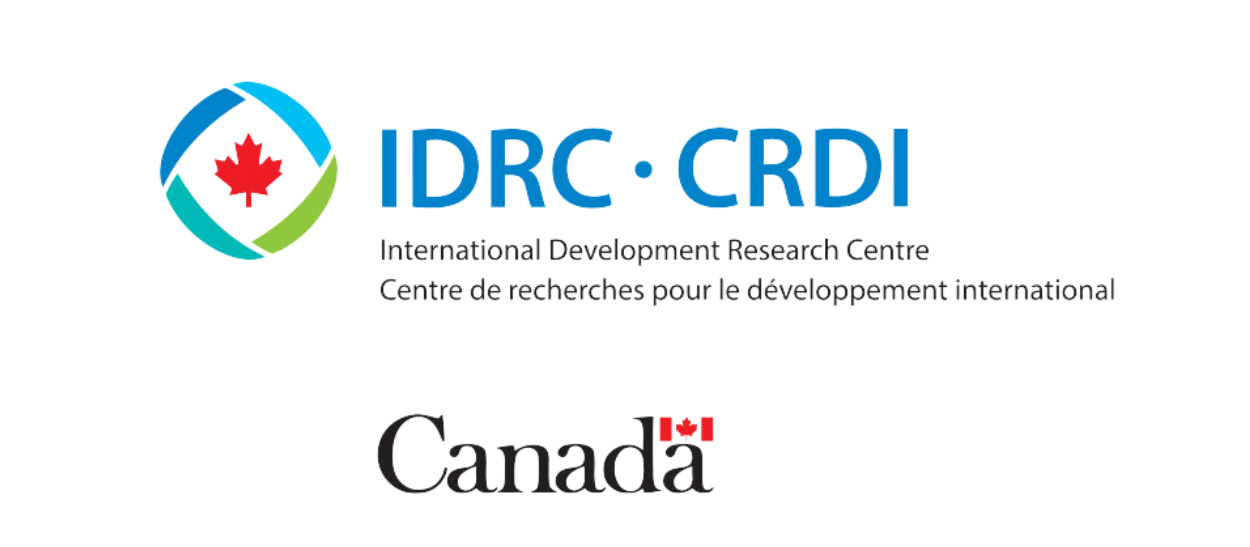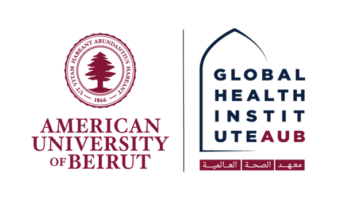
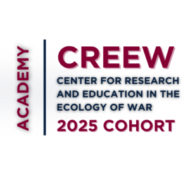
CREEW 2025 Thematic Topic: Preparing for Climate Change Impact on Health in Conflict Settings
Climate change poses a significant threat to human well-being, impacting social, economic, and health systems worldwide. Shifting climate patterns escalate the frequency and severity of extreme weather events, exacerbating health risks such as heat related fatalities, non-communicable diseases, infectious illnesses, and damaged infrastructure and agriculture. These risks disproportionately impact vulnerable groups, particularly those in conflict-affected areas prevalent in Low Middle Income Countries (LMIC) across the Middle East and North Africa (MENA) Region. The state of chronic and pervasive nature of conflict in the MENA region exacerbates health challenges due to the preexisting weak health infrastructure, poverty of data, and insufficient human resources. Consequently, these nations are placed in a precarious position as they strive to manage without external support for optimal preparedness and response efforts. Research plays a pivotal role in preparing for the health impacts of climate change in conflict settings, through basic exploration and/ or applied solutions. Thus, there is an urgent need to translate the experiences of those working on the ground into actionable measures.
Through a mentored fellowship program, the Center for Research and Education in the Ecology of War equips frontline health practitioners working in conflict settings with the necessary skills that would enable them to conduct research on relationships between health and war. By examining the effects of social and environmental determinants, assessing climate sensitivity of diseases, and evaluating current coping mechanisms, research can inform evidence-based strategies for building climate resilient healthcare systems in conflict settings.
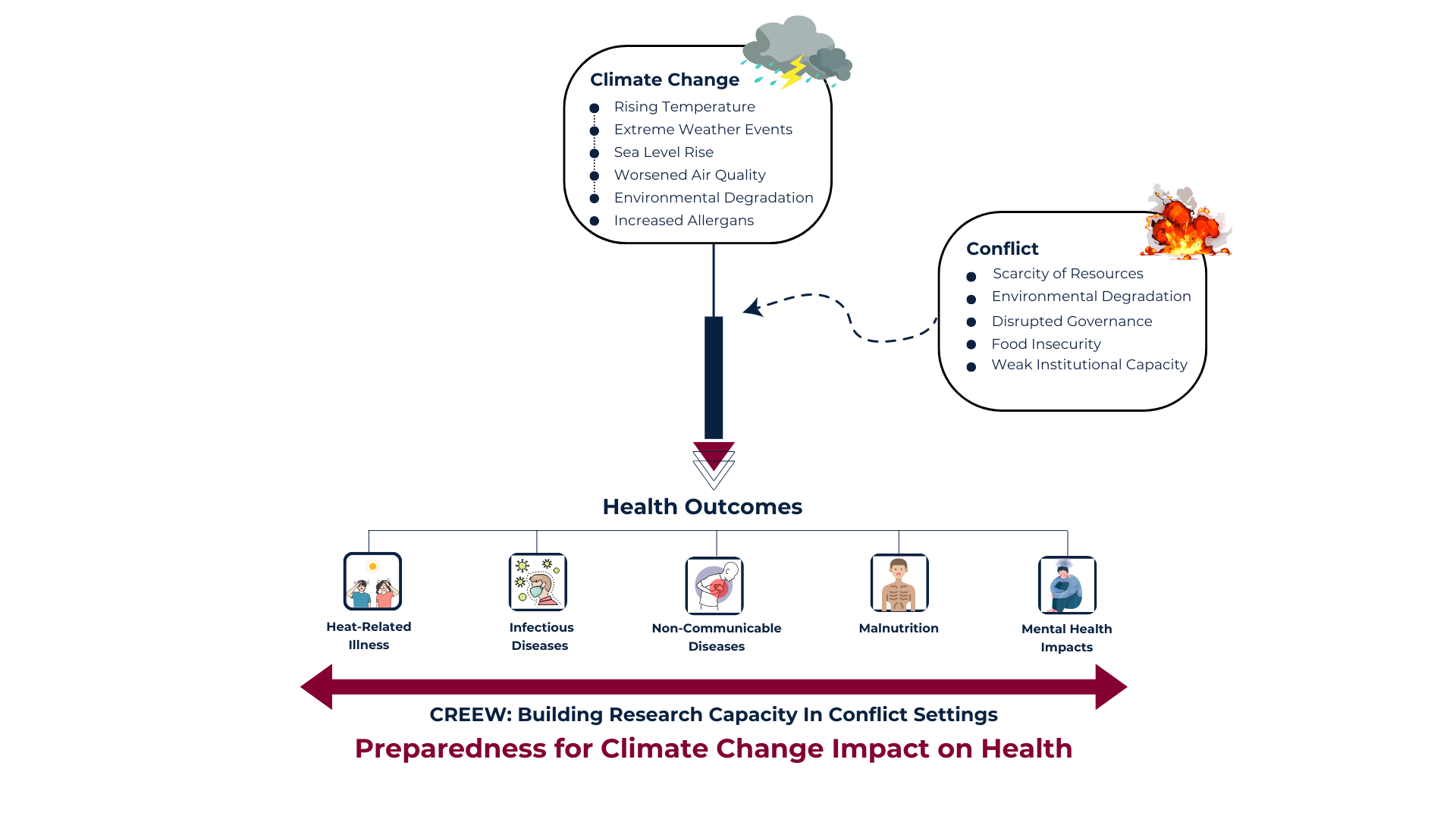
CREEW 2025 Fellowship Structure
The CREEW 2025 mentored fellowship adopts an online learning modality to train practitioners working in conflict-affected settings to conduct research on Preparedness for Climate Change Impact on Health in Conflict Settings. CREEW is a 12 month program that consists of three phases: Didactic Phase, Field-based Mentored Research Phase, and Research Dissemination Phase.

Didactic Phase (up to 8 weeks)
The didactic phase includes an online Certificate in Conflict Medicine (CCM) and online training workshops.
Online Certificate in Conflict Medicine:
The online certificate in conflict medicine (CCM) has been developed by GHI in collaboration with King’s College in London. The certificate aims to provide an operational and conceptual understanding of how medical care and research can be shaped and undertaken in settings of conflict and fragility. The certificate includes 4 courses: Introduction to Conflict Medicine, Medical Care and Knowledge in Conflict, Health Research Methods in Conflict, and a Specialty Course. With regards to the specialty course, participants will be presented with a choice between two options: 1. “Infectious Diseases in Conflict,” which explores the role conflict plays in re-emergence or spread of infectious diseases, especially in the MENA region, shedding light on challenges and solutions within this context or 2. they may select a course on “Detection and Assessment”, which explores the role of risk assessment, risk communication, surveillance systems, and diagnostics for epidemic and pandemic preparedness, particularly in the context of the MENA region.
Online Training Workshops:
The online training workshops will constitute a series of workshops over 8 weeks that aim to transform the fellows’ research proposals into mature, applicable, contextualized, and ethical research projects. The workshops will also touch on Responsible Conduct of Research, Research Dissemination, PowerPoint Presentation, and Manuscript Writing.
Mentor Matching:
During the didactic phase, each fellow will be matched with a mentor from AUB or other regional or global partner organizations. Mentors will oversee the development of the detailed research plan during the online workshops including the IRB submission process.

Field-based Mentored Research Phase (up to 32 weeks)
During the research implementation phase, fellows will implement their research plans within their respective home countries. Utilizing online conferencing tools, fellows will engage in regular meetings with their assigned mentors, ensuring continuous guidance and support throughout the process. Fellows will also submit monthly reports which serve to document the advancements made during this phase.
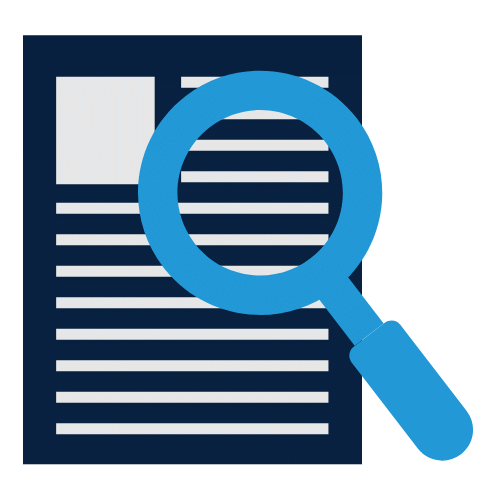
Research Dissemination Phase (up to 10 weeks)
During this final stage, fellows are tasked with generating a scholarly output within two months post-field research, in addition to the CREEW final report. This output, which can be a manuscript (original research article or a review article) or an abstract submission to a conference, is pivotal for the completion of the program. Collaborating closely with mentors and the CREEW administration, fellows refine their research prior to their formal submission.
CREEW 2025 Fellowship Certification
Upon successful completion of the three phases, the CREEW fellows will receive two certificates:

Online Certificate in Conflict Medicine
Issued by GHI

CREEW 2025 Certificate of Completion
Issued by GHI
CREEW 2025 Scientific Advisory Committee
Dr. Ghassan Abu Sittah | Co-chair
Director, Conflict Medicine Program; Global Health Institute (GHI), American University of Beirut (AUB), Lebanon
Dr. Souha Kanj | Co-chair
Head of Infectious Diseases Division; American University of Beirut Medical Center (AUBMC), Lebanon
Dr. Antoine Abou Fayad | Member
Assistant Professor, Department of Experimental Pathology, Immunology & Microbiology; American University of Beirut (AUB), Lebanon
Dr. Mey Jurdi | Member
Professor/ Chair, Department of Environmental Health; American University of Beirut (AUB), Lebanon
Dr. Zahi Abdul Sater | Member
Senior Advisor for Partnership and Innovation; Global Health Institute (GHI), American University of Beirut (AUB), Lebanon
Program Team
Nour Zaouk
Manager, Epidemic and Pandemic Preparedness Program; Global Health Institute (GHI), American University of Beirut (AUB), Lebanon
Dalia Sarieddine
Coordinator, Academy; Global Health Institute (GHI), American University of Beirut (AUB), Lebanon
Dr. Hadil Mdaihly
Associate Coordination Officer, Academy; Global Health Institute (GHI), American University of Beirut (AUB), Lebanon
APPLICATION
ELIGIBILITY CRITERIA
Designed for fellows who are interested in developing their research capacity and are positioned to access data, ensuring the feasibility of collecting and implementing the proposed project.
- Health Professional Background: Applicant should be a working health professional with documented experience or an interest to work in conflict settings. (Examples:Physician, nurse, pharmacist, laboratory technician, dietitian, etc…). The applicant must be interested to pursue research work in conflict settings and the thematic topic.
- English Proficiency: Applicant must demonstrate a level of English proficiency consistent with the demands of the CREEW Fellowship. The courses will be conducted almost exclusively in the English language.
APPLICATION REQUIREMENTS
- Letter of intent: The letter of intent should be a maximum of 1 page and should include:
- General description of project of interest.
- Title of proposed project.
- Population of interest.
- Significance of project to the country.
- How the applicant’s professional position allow for data collection and implementation of the proposed project.
- Personal Statement: The personal statement should be a maximum of 1 page and should include:
- Relevant academic and professional background.
- Experience in working within conflict settings.
- Reasons for applying to the CREEW fellowship.
- How will the CREEW fellowship help you achieve your academic and career goals.
- Recommendation Letters: The applicant should submit two recent recommendations letters from professionals who are familiar with the applicant’s work experience, and/or academic abilities. (Letters from family members or friends will not be accepted).
- An Updated Curriculum Vitae: Please use the following template (CV Template).
APPLICATION DEADLINE: August 30, 2024
FELLOWSHIP START DATE: October 1, 2024
CREEW 2025 Fellowship Tuition

TUITION FEES:
$5000

SPONSORSHIP
This will include costs of Online Certificate in Conflict Medicine, online training workshops, and mentorship fees.
CREEW 2025 Fellowship Program is Fully Sponsored by GHI. The sponsorship will cover costs of the Online Certificate in Conflict Medicine, online training workshops, mentorship fees, and research costs.
CREEW 2025 Fellows

Dr. Ghada El-Zein
Lebanon
Profile
Dr. Ghada El-Zein is the Director of Health and Social Services at Imam Sadr Foundation and an expert in healthcare management, quality improvement, and mental health rights.

Ms. Hosna Hamidi
Afghanistan
Profile
Ms. Hosna Hamidi is a WHO Regional Health Cluster Coordinator with expertise in emergency response, risk management, and health communication in Afghanistan.

Ms. Faten Abdalla
Syria
Profile
Ms. Faten Abdalla is a healthcare and pharmaceutical expert with 15+ years of experience, currently serving as a National Professional Officer with WHO in Northeast Syria.
SUPPORTED BY
